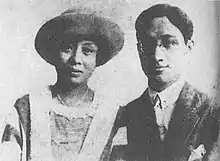Zhang Youyi
Zhang Youyi (Chinese: 張幼儀; Wade–Giles: Chang Yu-i; 1900–1988)[1] was a Chinese educator, banker, and the first wife of the Chinese poet Xu Zhimo. With assistance from her brother Chang Kia-ngau, who was the general manager of Bank of China, she ran her own bank, Shanghai Women's Savings Bank.
Zhang Youyi (Chang Yu-i) | |
|---|---|
 Zhang Youyi and Xu Zhimo | |
| Born | 1900 Shanghai, China |
| Died | 1988 (aged 87–88) New York City, United States |
| Occupation(s) | Banker, educator |
| Spouse(s) | Xu Zhimo Su Jizhi (m.1954 wid.1972) |
| Children | Hsu Chi-kai (b. 1918) Peter Hsu De-sheng (1922-1925) |
| Relatives | Natasha Chang Pang-mei (grand niece) |
Early life
In 1912, when Zhang Youyi was aged 12, she found an advertisement in the newspaper Shen Bao about a girls' school in Suzhou called the Teachers' College Preparatory School. She proposed the idea of attending to her parents and they agreed. She was admitted after passing the entrance exam, along with her elder sister. However, in the 1913, her brother Zhang Gongquan arranged for her marriage with Xu Zhimo, a rising poet and son of a rich businessman. Upon her parents' urging, Zhang quit school and returned home in 1915 to prepare for her wedding.
Marriage
She married the prominent poet Xu Zhimo (Hsu Chih-mo), and gave birth to two sons, Hsu Chi-kai (born 1918) and Peter Hsu (1922 – 1925). After giving birth to Peter, Youyi received a letter from her estranged husband, declaring his intentions to divorce. In his letter, Xu reasoned that "marriage not based on love was intolerable." Zhang consented, and signed the divorce papers. Their separation was the first legal divorce based on the Civil Law in China.[2]
Career
Zhang settled in Berlin in 1922. She studied German intensively for a few months, then enrolled at the Pestalozzi Furberhaus, a kindergarten teachers' college that espoused the philosophy of Swiss educator Johann Heinrich Pestalozzi.
Her younger son died of peritonitis in 1925. Upon her return from Europe in early 1927, she worked as a German lecturer at the Soochow University, then opened Shanghai's first garments corporation, manufacturing and selling fashionable women's dresses. In 1928, she accepted her brother's offer to serve as the vice president of the Shanghai Women's Commercial and Savings Bank.[3] She traded actively in the stock market and managed the finances of the China Democratic Socialist Party (1946-) with the assistance of her elder brother, Carsun Chang (Zhang Junmai 张君劢).
After Zhimo Xu's death in a plane crash, Zhang participated in the editing and publication of his poetry anthology. She moved to Hong Kong in April 1949. In 1953, she married doctor Jizhi Su in Tokyo. Together they lived for 18 years.
On her struggle for independence, Zhang once said: "I always think of my life as 'before Germany' and 'after Germany'. Before Germany, I was afraid of everything. After Germany, I was afraid of nothing."[2]
References
- "Too Modern for Old China, and Paying a Price". New York Times. October 1996.
- Chang, Pang-Mei Natasha (2011). Bound feet and Western dress. Random House. ISBN 9781446488607. Retrieved 26 November 2019.
- Zhaojin, Ji (2016). A History of Modern Shanghai Banking: The Rise and Decline of China's Financial Capitalism: The Rise and Decline of China's Financial Capitalism. Routledge. ISBN 9781317478072. Retrieved 26 November 2019.
- Chang, Pang-Mei (Natasha) (1996). Bound feet & Western dress. New York: Doubleday. ISBN 0385479638
External links
- Reminiscences of Xu Zhimo
- 從棄婦到女強人,張幼儀是如何展現霸氣女力的?——西服與小腳的夫妻婚變男權棄婦的依附與自強
- 張幼儀的啟示
- 張幼儀晚年憤憤不已 一句話評價徐志摩放蕩
- 张幼仪:感谢徐志摩,离婚让我找到自己